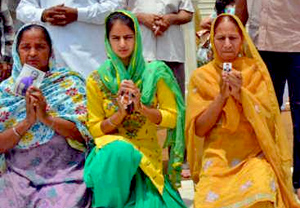 New Delhi, Jun 21: There was evidence that several hundreds of Indians were stranded in Najaf province of Iraq as their employer has refused to return their passports, Amnesty International said on Saturday.
New Delhi, Jun 21: There was evidence that several hundreds of Indians were stranded in Najaf province of Iraq as their employer has refused to return their passports, Amnesty International said on Saturday.
"With fighting between state forces and armed groups intensifying and affecting civilians across Iraq, the stranded Indian workers could be facing rising dangers," Amnesty International India said in a press release.
It said it spoke over phone to some of the Indian workers, "who said they have not been paid salaries for the past five months" and their passports have been held.
"We have been restricting ourselves to the company premises since the conflict began because we are scared. Without our passports, we can't leave this country, and every passing day makes us feel more and more unsafe. We just want to go home," one of the workers was quoted as telling Amnesty.
The workers also told Amnesty that they had raised this concern with the Indian embassy in Baghdad, which asked them to provide their passport details via text messages.
The workers sent the details June 19 and were now awaiting a response.
Another worker, who Amnesty spoke to, said their employer told them they were safe and would be moved to safer locations if they perceived a threat from the armed groups led by the Islamic State in Iraq and al-Sham (ISIS).
Another worker said they were only 200 km from the conflict zone.
The international human rights organisation welcomed the Indian government's initiatives to evacuate stranded workers quickly and urged it to "pay special attention to migrant workers who may have had to hand over their passports and other travel documents to their employers".
It also called on the armed groups to immediately and unconditionally release all unharmed civilians they were holding as hostages, and end all attacks on civilians.
Amnesty further said it had called on the telephone lines of the construction company as well as on the mobile phones of three of its managers June 20, but could not speak to anyone for their response.
"Migrant workers, including those from India, are among the most vulnerable groups in Iraq" in the ongoing violence, it said.
"Under international humanitarian law, state and non-state actors are obligated to take necessary precautions to avoid endangering the civilian population. The parties to the conflict must facilitate the safe passage of all civilians wishing to flee the fighting," it said.





Comments
Add new comment